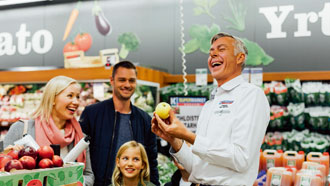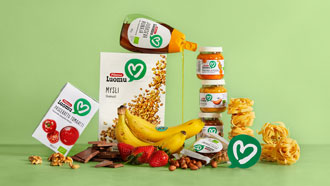TRACE YOUR PRODUCTS
K Group is constantly striving to improve the transparency of its purchasing chains. On this website, our customers can find out more about where the products they purchase from K Group stores come from.
Where do mywear t-shirts, Pirkka and K-Menu tuna products, Pirkka Fairtrade roses, and PROF Timber sold in our stores come from? We want to increase the transparency of our purchasing chains by providing information on the origin of our products and their journey to our stores. Choose a product to find out more.
K Group’s purchasing of seafood is guided by our Fish and shellfish statement, which is based on WWF's seafood guide. All Pirkka and K-Menu branded canned tuna comes from sustainable fish stocks listed yellow or green in the WWF guide.
Read moreThe blue, oval-shape MSC label indicates that the tuna has been fished by MSC-certified, responsible fishing companies. The Pirkka range also offers MSC-certified tuna.
Read moreAll K Group canned tuna producers have been granted the Dolphin Safe certificate, which guarantees that their tuna fishing methods do not endanger dolphins.
Read moreWe use third-party amfori BSCI auditing to assure social responsibility in the factories of our tuna suppliers. The amfori BSCI auditing monitors working conditions in factories and farms, including workplace safety, salaries, working hours and compliance with the ban on child and forced labour, among other aspects.
K Group’s Quality and Product Development Unit's laboratory monitors the safety and quality of own brand products and own imports in the grocery trade. We require that all manufacturers have valid GFSI-recognised certifications that assure product safety.
We ensure the safety of our own brand food products. Pirkka and K-Menu cans do not contain detrimental elements such as Bisphenol.
In line with our plastics policy, we are reducing the use of plastics and promoting plastics recycling. By the end of 2025, all packaging for our own brand products will be recyclable, reusable or biodegradable.
Our Pirkka and K-Menu branded canned tuna products are skipjack tuna. Our Pirkka Parhaat premium range has two canned yellowfin tuna products. All Pirkka and K-Menu tuna has been sustainably fished. 

Skipjack tuna
(Katsuwonus pelamis)
Skipjack tuna is a small fish and the most commonly used species for canned tuna. It is related to tuna, but not one of the true tunas, or thunnus. The species lives mainly in tropical areas of the Atlantic, Indian and Pacific Oceans. Skipjack tuna stocks are healthy and it is considered a “least concern” species.

Yellow fin tuna
(Thunnus albacares)
Yellowfin tuna can be found in the tropical waters of the Atlantic, Indian and Pacific Oceans. They travel in schools and eat fish, crustaceans, and squid. The biggest fish can weigh up to 200 kilos. Yellowfin tuna is sold both fresh and canned.
All tuna for our canned own brand Pirkka and K-Menu products comes from either Mauritius, Thailand, Spain or Portugal. Our suppliers process the canned tuna in factories in their countries. The tuna cans are driven in a truck to the harbour. They then travel in a container ship to the Netherlands, on a smaller ship to Helsinki in Finland, and finally on a truck to K Group’s central warehouse in Vantaa.
The Food and Agriculture Organization (FAO) of the United Nations has established 27 fishing areas based on statistical data-gathering, the management of fisheries, and jurisdictional purposes. The boundaries of the areas were determined on various considerations, consulting international fishery agencies. This map shows the FAO fishing areas where Pirkka and K-Menu tuna come from.
Pirkka and K-Menu canned tuna has been sustainably caught. The sustainability of fishing stocks depends on the fish species, the fishing area, and the method of fishing. K Group complies with the recommendations of WWF’s seafood guide, and we only accept in our selections fish species with fishing methods and fishing areas that do not harm fish stocks. The most sustainable alternatives are selective fishing methods such as handlining, pole fishing, and purse seine fishing of freely swimming tuna. The fishing methods employed for canned Pirkka and K-Menu tuna are pole & line and purse seine.
Purse seine is an efficient method of fishing on open water. It does not damage the seabed and results in low levels of bycatch. The fishers surround a school of fish with a purse seine net, then pull the net together like a bag and bring the fish to the vessel. Fisheries using purse seine must ensure that they leave enough fish in the ocean to reproduce and that they do not threaten the survival of the fish stock.
Pole & line is a fishing method for tuna and other large pelagic species. When a school of fish is located, water is sprayed from the back of the fishing vessel and small bait fish are scattered onto the surface of the water to attract the fish. The fishing takes place at the back of the fishing vessel. The fishermen use a long wooden or fibreglass pole with a hook attached, and flick the fish onto the deck one by one. The method results in low levels of bycatch and does not hurt other sea animals, such as dolphins, shark, sea turtles or birds.

Together with our suppliers, we promote sustainable fishing and preserving ocean ecosystems. Our suppliers have established, reliable partners who catch the tuna.
We comply with the EU rules to combat illegal, unreported and unregulated (IUU) fishing. The rules ensure that illegally caught fish is not sold on the European market.
To ensure the quality and freshness of tuna products, tuna is frozen on the fishing vessel. The vessels only return to shore when their freezers are full to minimise transports and emissions. The tuna is then taken to the fish factory, where it is defrosted and processed. Then the tuna is precooked and cut into flakes, chunks or fillets, and canned. The products are subjected to a special heating process that ensures they stay edible for years. We have five suppliers for Pirkka and K-Menu branded tuna.
Sea Value PCL promotes environmental protection by supporting water resources and ecosystem health. Sea Value PCL also works hard to ensure that the fish they can is free from any illegal, unregulated and unreported (IUU) fishing. Sea Value PCL promotes social responsibility by operating ethically, openly and in line with internationally recognised human rights and practices.
Princes Ltd. protects ocean life and only works with partners that are committed to sustainable fishing. It does not source tuna from longliner vessels and does not permit transshipment at sea – one of the most effective means of avoiding IUU fishing and associated labour standards issues.
Thai Union has determined that environmental and social responsibility are essential parts of its business. SeaChange® is Thai Union’s global sustainability strategy that covers the whole production chain from protecting the oceans to sustainable procurement of ingredients, appropriate waste management and responsibility for workers. Thai Union is committed to set science-based emission reductions targets. Read more
Siam International Food Co Ltd. is constantly working for environmental and social responsibility. The company has implemented an Environmental Management System since 2012 to comply with ISO 14001. The company’s operating principles acknowledge the rights and working conditions of the workers – especially migrant workers. With ingredients, special attention is paid to traceability and the prevention of IUU fishing and associated labour standards issues.
Founded in 1961, Frinsa Group is one of the largest European manufacturers of canned tuna and shellfish. Its factories are located in Ribeira, Spain and in Povoa de Varzim, Portugal. Frinsa’s main objective is to produce high-quality canned products that meet customers’ expectations in a sustainable and environmentally friendly way. Sustaining the marine environment is one of Frinsa’s main pillars.

Kesko Corporation is the only company in the world to have been included on the Global 100 Most Sustainable Corporations in the World list by Corporate Knights every year since the list was first established in 2005.
Read more
Do you have questions about the origin or qualities of Pirkka products? Contact K Consumer Service by phone on 0800- 0- 1000 or via email at kuluttajapalvelu(at)kesko.fi.
Read more
Are you looking for new tuna recipes? Plenty of recipes are available at K-ruoka.fi. Why don’t you try tuna bowl?
Read moreWould you like to learn more about another product? See here for the products: